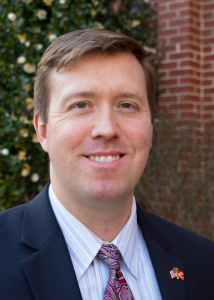
Tell us about the GSHIP Program.
Our cash management team administrates the GSHIP program, which gives health insurance to graduate student assistants and research assistants. It’s different than student health insurance, as the university departments pay for this type of coverage. Enrollment is twice per year – usually when students arrive in August or in December, if they are transferring. Each month, the university spends a little over $1 million in GSHIP insurance. In October of this year, we enrolled 3,127 people into the program, and paid $3,893 annually per student for this benefit.
How does your role fit within the University?
The University Cash Manager and the cash management team ensures that we have enough money in the bank to fund all the university’s obligations. We fund pay cycles, reconcile cash advances and oversee the Imprest Checking accounts, which are used in departments and research studies. So, we are checking that the amount of money that we currently have in the bank can pay all the bills. As the money runs low, we replenish it from parking fees, ticket sales and short term investments, among other sources. When our cash flow exceeds our short-term needs, we prudently invest the funds to maximize the university’s returns. We have a temporary investment pool that is highly liquid, as well as intermediate investment funds which are for longer-term investments.
What’s a typical day like in your job?
Usually, we come in and immediately start the process of funding pay cycles in partnership with Disbursement Services. We wire funds to different accounts for ACH and check payments. We sweep parking, ticket sales and gift accounts into our main trust account. We file sales and use taxes for the university and stay on top of our bank account reconciliations. Once we reach the afternoon, we wire money all over the world, as the university funds research projects or study abroad programs. We need to ensure the accuracy of these foreign wire payments and their exchange rates. We are constantly reviewing deposits and cash advance journal entries to make sure they have accurate accounting information.
Are there any interesting developments coming up in Cash Management?
Yes. Starting in January, Cash Management is working to phase out the Imprest Accounts and switch over to prepaid cards, as the Imprest accounts are highly susceptible to fraud. Departments must watch these accounts carefully and have sometimes had to get the police involved when it appears an account has been compromised. Although it’s not an ultimatum, we really want to move in that direction as the prepaid cards are far more secure. In the future, we want to evolve to newer technologies like Digital Disbursement for payment, using platforms like Venmo, PayPal and Zelle – where we can pay people directly by sending them an email or text.
How did you come to be the Cash Manager?
I was an infantry officer in the Marine Corps and served in Iraq, where I was decorated for valor in combat. After leaving Corps, I worked for a Fairfax County Supervisor, which is equivalent to a county commissioner in North Carolina. I helped communities implement policies and projects that improved their lives. It was then I realized that I love working for the public and the government to help them innovate and become more efficient.
What do you like most about your work?
I love the team here, honestly – it feels like a family. Everyone is out to help each other and get the job done. I really like that at UNC, but I find it in Accounting Services in particular.
What is something people don’t know about you?
I’m a writer, and really enjoy reading poetry. American poet W.S. Merwin is one of my favorites – he writes a lot of nature poetry. I am also interested in the Elizabethan and Romantic era and read Marlowe, Shakespeare, Shelly and Byron, who I studied at Virginia Tech and later at William and Mary. I also enjoy reading — mainly historical biographies and nonfiction — and having fun with my wife and our two girls, June and Sophie.
How does your job support Carolina’s mission?
Essentially, we are here to make sure that we have the cash to get people paid; that the lights stay on; that professors can teach, research and travel and that students have all the resources they need to obtain a world class education at the second-best school in the United States (after William and Mary, of course)!
If you have any questions on any of these areas I’ve mentioned, please feel free to contact us.
